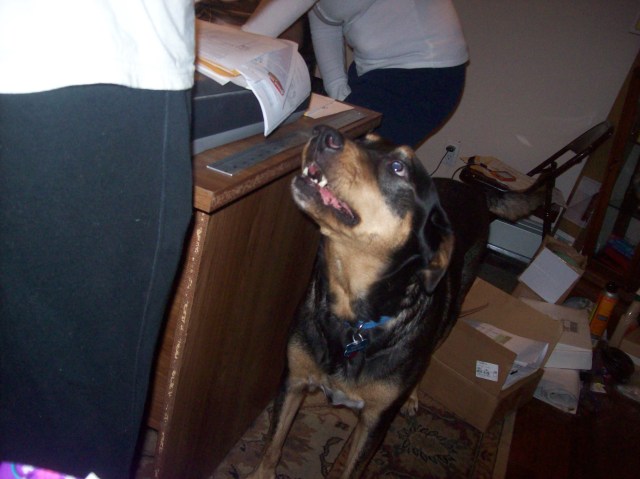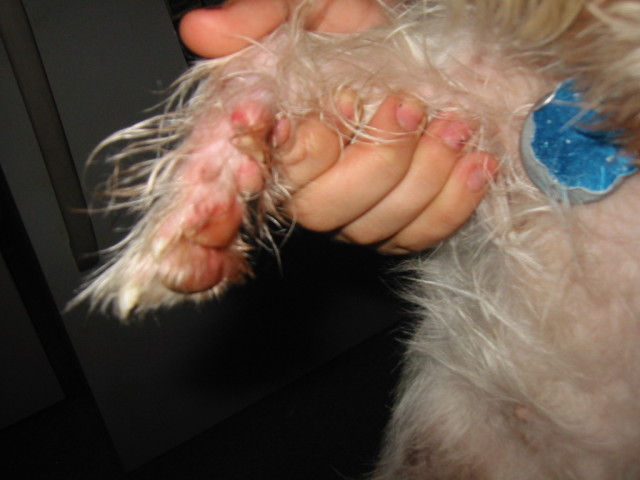Question
 he was barking!
he was barking!
I have a Dog who is a german shepard/ rottie mix that i adopted about 8 years ago. He always had temperment problems but lately he has been very mushy and lets people pet him when usually he would not want to be pet. He also started limping, it looks like its a problem with his hips maybe? i dont know. He can barely stand and get up the stares, i feel so bad he is so miserable theres really nothing i can do. He is 9 years old is this the old age process? We also have another rottie mix tht is 2 years old and is a little ball of energy so her tackling him and trying to play with him all the time doesnt really help! any advice on the situation?
Thanks so much! - tori (worried and sad dog owner)
Answer
Hi Tori,
Since your dog is large, and at least 9 years old, he would be considered elderly. Given his breed mix, he probably has hip dysplasia or arthritis, which would explain his lameness. There are things you can, and should do! Start by having him examined by a veterinarian. There are medications to help improve his mobility and control the pain that goes along with these conditions. Joint degradation is a progressive problem, so controlling the symptoms is important. There are no miracle cures, but much can be done to make old dogs with arthritis more comfortable and improve their lives.
If you are having trouble afford veterinary care, first talk to your regular vet. Ask your veterinarian if he or she will let you work out a payment plan. Many veterinarians are willing to work out a weekly or monthly payment plan so that you do not have to pay the entire cost of veterinary care up front. Another option is to contact your local shelter or Humane Society. Some shelters operate or know of local subsidized veterinary clinics or veterinary assistance programs. If you happen to live within driving distance to veterinary school, check with them to see if they offer discount services to the public. There are two special credit cards to apply for which help with medical bills (including veterinary bills) read about them here:
http://www.carecredit.com
http://www.healthcard.citicards.com
Be sure your elderly dog has a warm place to sleep, and that he has soft but firm bedding. "Egg-crate" foam beds are great for elderly dogs. It can be helpful to lay down carpet runners on smooth floors to help with traction. Short, slow, gentle exercise is important. Once around the block two or three times a day is about right. If you don't walk your dog, but leave him outside in a fenced yard, he isn't getting the exercise he needs. Exercise helps reduce pain, prevents further joint damage and can help your pet maintain a healthy weight. Disuse of a sore joints will cause the muscles around it to weaken, resulting in pain. Avoid strenuous activity on the weekends alternating with little or none during the week. Leashed walks are best for elderly dogs, walk at your dog's pace. If your dog isn't used to going on walks, start out with very short walks, increasing the distance you go week by week.
Older large-breed dogs tend to be overweight. This discourages them from getting the exercise they need and aggravates their arthritis. The more weight on those poor old joints, the harder it is to move around. You should be able to easily easily locate each of your dog's ribs when you feel for them.
Protect your elderly dog from your younger dog. It causes him pain when the younger dog tackles him, and she can do some real harm. Do not leave the two dogs unsupervised if you know she's going to start roughhousing. It may be necessary to separate the dogs when you can't supervise them.
I hope I've been a help.
Best of luck,
Patti


 Dog Worms
QuestionDog Poo
Dog Poo
QUESTION: Ive got
Dog Worms
QuestionDog Poo
Dog Poo
QUESTION: Ive got
 Dog unwilling to eat
Question
Maggie
I have a 4 year old daschund female.She
Dog unwilling to eat
Question
Maggie
I have a 4 year old daschund female.She
 dew claw bleeding
Question
tashas paw
Hi I have a 2yr old female shutzu/M
dew claw bleeding
Question
tashas paw
Hi I have a 2yr old female shutzu/M
 my 3 year old welsh corgi
Question
Bella
I have 2 old cairn terriers, 12 and 15 (
my 3 year old welsh corgi
Question
Bella
I have 2 old cairn terriers, 12 and 15 (
 what is my dog????
Question
Connie
Patti, i got my dog Connie a few months
what is my dog????
Question
Connie
Patti, i got my dog Connie a few months